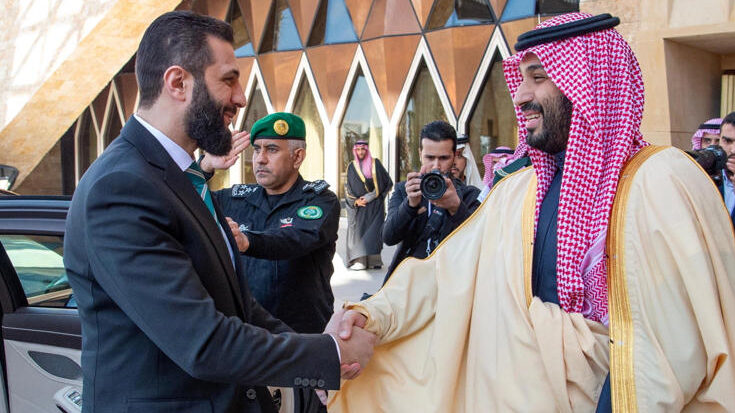Saudi Arabia Welcomes Syria’s New Government: A Shift in Middle Eastern Diplomacy
In a significant development in Middle Eastern politics, Saudi Arabia has officially welcomed the formation of a new government in Syria. This marks a pivotal shift in regional alliances and diplomatic relations, as the two countries take steps toward renewed cooperation. The Saudi endorsement follows the establishment of an interim administration in Damascus, which has replaced the long-standing regime of President Bashar al-Assad.
Saudi Arabia’s Support for Stability in Syria
The Saudi Foreign Ministry expressed its support for Syria’s new leadership, emphasizing the importance of stability, unity, and reconstruction in the war-torn country. The Kingdom reaffirmed its commitment to supporting Syria’s sovereignty and territorial integrity. Officials have also highlighted Saudi Arabia’s readiness to assist in Syria’s post-war recovery through diplomatic engagement, economic investment, and regional cooperation.
For years, the relationship between Saudi Arabia and Syria was strained due to the ongoing civil war and Assad’s alliance with Iran. However, this recent development signals a new era of diplomacy in the region, one that could reshape alliances and foster long-term stability.
Diplomatic Engagements and Regional Implications
Syria’s new leadership, under interim President Ahmed al-Sharaa, has already begun engaging with regional powers to strengthen ties. One of the key diplomatic moves was al-Sharaa’s visit to Saudi Arabia, where he met with Crown Prince Mohammed bin Salman. The meeting focused on discussions regarding regional security, economic collaboration, and future diplomatic relations between the two nations.
Additionally, Syrian Foreign Minister Asaad Hassan al-Shaibani has announced plans to visit Saudi Arabia. This will be his first official trip abroad since assuming office, highlighting Syria’s efforts to rebuild diplomatic relations. Analysts believe these engagements could lead to deeper cooperation in trade, security, and economic reconstruction.
International Response and Sanctions
Saudi Arabia has also taken a proactive stance in advocating for the lifting of international sanctions on Syria. Saudi Foreign Minister Prince Faisal bin Farhan has emphasized that ongoing sanctions would only hinder Syria’s development and make reconstruction efforts more difficult. The Kingdom is now engaging in discussions with international partners, including the United States and the European Union, to explore ways to ease these restrictions.
The response from the international community has been mixed. While some Western nations remain cautious due to concerns over the origins and structure of Syria’s interim government, others are acknowledging the necessity of supporting Syria’s stabilization. Some countries have already begun to ease restrictions, allowing limited financial transactions to facilitate humanitarian aid and reconstruction efforts.
Economic Cooperation and Reconstruction Efforts
The normalization of ties between Saudi Arabia and Syria has also opened doors for economic collaboration. Saudi Arabia has pledged to assist in Syria’s reconstruction, focusing on infrastructure development, energy projects, and improving living conditions for Syrian citizens. The Kingdom is expected to play a crucial role in financing rebuilding projects, attracting foreign investments, and fostering trade relations between Syria and the broader Middle East.
Saudi Arabia’s involvement in Syria is also seen as a strategic move to counterbalance the influence of other regional powers, particularly Iran and Turkey. By supporting the new Syrian government, Riyadh aims to promote long-term stability, curb extremist activities, and address issues such as the illicit drug trade, which flourished under the previous regime.
Geopolitical Ramifications
This shift in Saudi-Syrian relations could have significant geopolitical ramifications.
- Saudi-Iran Relations: Given Iran’s historical support for Assad, Riyadh’s endorsement of the new government in Syria could alter the balance of power in the region.
- Arab League Dynamics: With Syria gradually reintegrating into Arab diplomacy, there may be efforts to reinstate its full membership in the Arab League, which was suspended in 2011.
- US-Saudi Relations: While Washington has maintained a cautious approach toward Syria, Saudi Arabia’s move to engage with the new leadership might influence broader Western policies toward the country.
Conclusion
Saudi Arabia’s decision to support Syria’s new government marks a transformative moment in Middle Eastern diplomacy. This move not only signifies a shift in regional alliances but also opens avenues for economic cooperation and reconstruction efforts. As both nations embark on this renewed partnership, the focus remains on fostering stability, unity, and prosperity in the region.
While the road ahead presents challenges, the gradual normalization of Saudi-Syrian relations could contribute to a broader realignment of Middle Eastern geopolitics. As regional players navigate these changes, the world will be watching closely to see how this new chapter unfolds for Syria and its partners.
Do follow gulf magazine on Instagram
for more information click here


